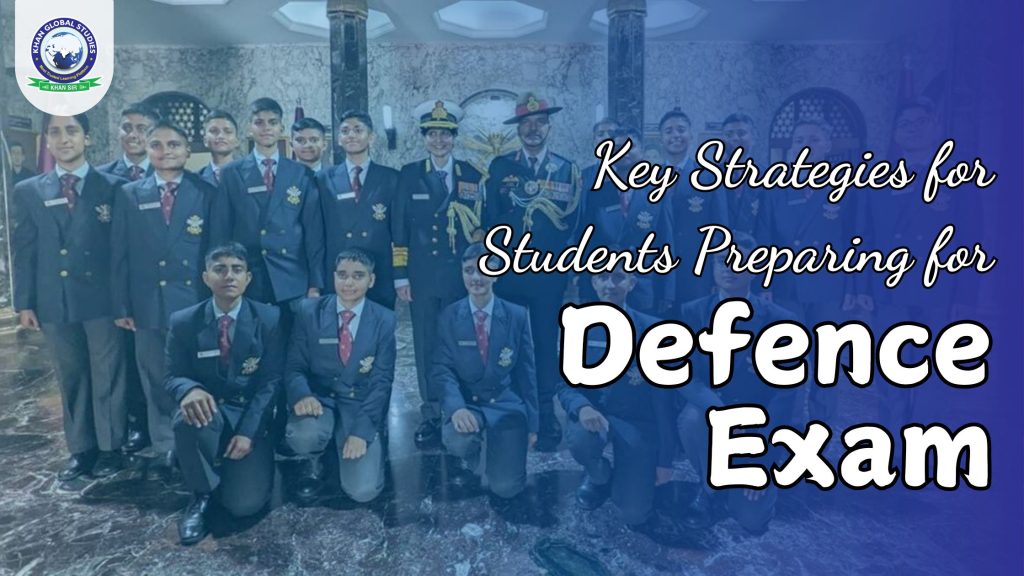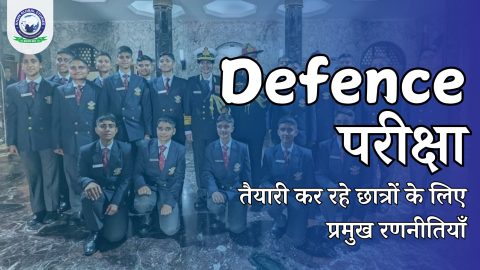Preparing for NDA, CDS, AFCAT or other defence exams requires a focused strategy, unwavering dedication and the right resources. Defence exams are highly competitive, involving not just intellectual prowess but also physical fitness and mental resilience. Students aspiring to join the Indian armed forces need to strike the right balance between academic preparation and personal development. In this guide, we will cover the essential tools, techniques and habits that can significantly benefit students in their defence exam preparation journey.
1. Comprehensive Study Material and Resources
The basis of any successful defence exam preparation is access to the right study material. Students should focus on these things:
- NCERT Books: For basic concepts, especially in Maths and Science, students should rely on NCERT textbooks (from classes 6 to 12) as they provide a solid foundation.
- Subject-specific Books: For subjects like General Knowledge, Current Affairs, English and Maths, students should invest in subject-specific guides. Books from publishers like Arihant, Pathfinder and Lucent GK are highly recommended.
- Previous Year Question Papers: Solving previous question papers gives a clear idea of the exam pattern and common question formats. Students should practice them regularly to familiarise themselves with the types of questions they may face.
2. Time Management and Study Schedule
Time management is crucial to cover the vast syllabus of defence exams. Creating a well-structured study schedule ensures that students stay on track and cover every topic in depth. Here are some key tips:
- Daily and Weekly Goals: Divide the syllabus into manageable parts. Set daily and weekly goals to ensure steady progress.
- Time Blocking: Allocate specific time slots for different subjects. For example, 2 hours for Maths, 1 hour for English and another hour for General Knowledge each day.
- Revision Time: Always include time for regular revision, especially when the exam is near. Revision strengthens retention and reduces last-minute stress.
3. Practising Mock Tests and Solving Sample Papers
The best way to assess preparation is through regular mock tests. Mock tests and sample papers simulate the actual exam conditions, helping students evaluate their speed and accuracy. The benefits of this practice are enormous:
- Understanding the Exam Pattern: Mock tests familiarise students with the pattern and structure of the exam, helping them identify areas they need to work on.
- Time Management Skills: Solving sample papers under timed conditions helps students manage their time effectively during the actual exam.
- Boosts confidence: Regular practice of mock tests improves the confidence of students, thereby reducing anxiety before the actual exam day.
4. Physical Fitness Preparation
Defence exams are not just about intellectual ability; it also require physical fitness, especially if the exam leads to a Service Selection Board (SSB) interview. Students should include physical training in their routine. Here are some beneficial fitness exercises:
- Cardio Workouts: Activities like running, swimming and cycling help in building stamina, which is important for the physical tests in SSB.
- Strength Training: Push-ups, sit-ups, squats and other body-weight exercises help in improving strength and agility.
- Consistency: Physical training should be done regularly, with at least 30 minutes to an hour of exercise daily. Consistency in workouts builds stamina and fitness over time.
5. Stay Updated with Current Affairs
Current affairs play a major role in the General Knowledge section of defence exams. Students should make it a habit to stay updated on the latest happenings in national and international news, defence-related updates, and other important events. Here’s how to stay informed:
- Daily Newspapers: It is important to read credible newspapers like The Hindu, Indian Express, or Times of India to stay updated.
- Monthly Current Affairs Magazines: Magazines like Competition Darpan and Competition Success Review (CSR) provide concise information on major current events.
6. Develop the Right Mindset and Focus
Mental resilience is as important as academic and physical preparation. Defence exams require candidates to handle pressure efficiently. Developing a positive mindset and maintaining focus can make a huge difference. Here are some tips to build mental strength:
- Stress Management: Meditation and breathing exercises help reduce stress and anxiety, which can affect performance.
- Positive Thinking: Maintain an optimistic outlook even when faced with challenges. Believe in your ability to succeed.
- Breaks and Rest: Studying for long hours without breaks can lead to fatigue. Taking short breaks, getting adequate sleep, and finding time for relaxation are essential to ensure top performance.
7. Group Study and Peer Discussion
Studying in groups can be highly beneficial for defence exam aspirants. Peer discussion and group study allow for the exchange of ideas and clarification of doubts. Here is why group studies are effective:
- Shared Knowledge: Group discussions enable students to gain insight into different viewpoints on the same topic.
- Motivation: Studying with peers fosters a sense of healthy competition and motivation, prompting everyone to work hard.
- Resolving Doubts: Group members can help each other understand complex concepts that may be difficult to grasp while studying alone.
8. Guidance from Mentors and Coaching Institutes
While self-study is essential, students should also seek guidance from mentors or experienced professionals who specialise in defence exam preparation. Coaching institutes offer structured guidance, mock tests, and expert tips that can give students a significant edge. Here is how mentors and coaching help:
- Targeted Strategies: Professional coaching helps students understand exam strategies, such as which sections to attempt first or how to tackle tricky questions.
- Regular Feedback: Coaches provide individual feedback, identify weaknesses and provide solutions to improve performance.
- Mock Interviews: Coaching institutes frequently conduct mock interviews and SSB preparation, which helps students gain confidence for the next stages of the selection process.
9. Nutrition and Health
Good nutrition plays a vital role in maintaining both physical and mental performance. Students should focus on a balanced diet to stay energetic and focused during their preparation:
- Hydration: Drink plenty of water to stay hydrated and alert.
- Balanced Diet: Include fruits, vegetables, proteins and whole grains in your diet to keep your body and mind healthy.
- Avoid Junk Food: Avoid heavy, greasy or processed foods that can make you feel sluggish and reduce concentration levels.
Conclusion
Defence exam preparation is a holistic process that combines academic, physical and mental preparation. By incorporating these beneficial practices, students can improve their chances of success and make their defence exam preparation more effective. From regular study schedules and fitness routines to staying updated on current affairs, every little step counts to excel in these highly competitive exams.




